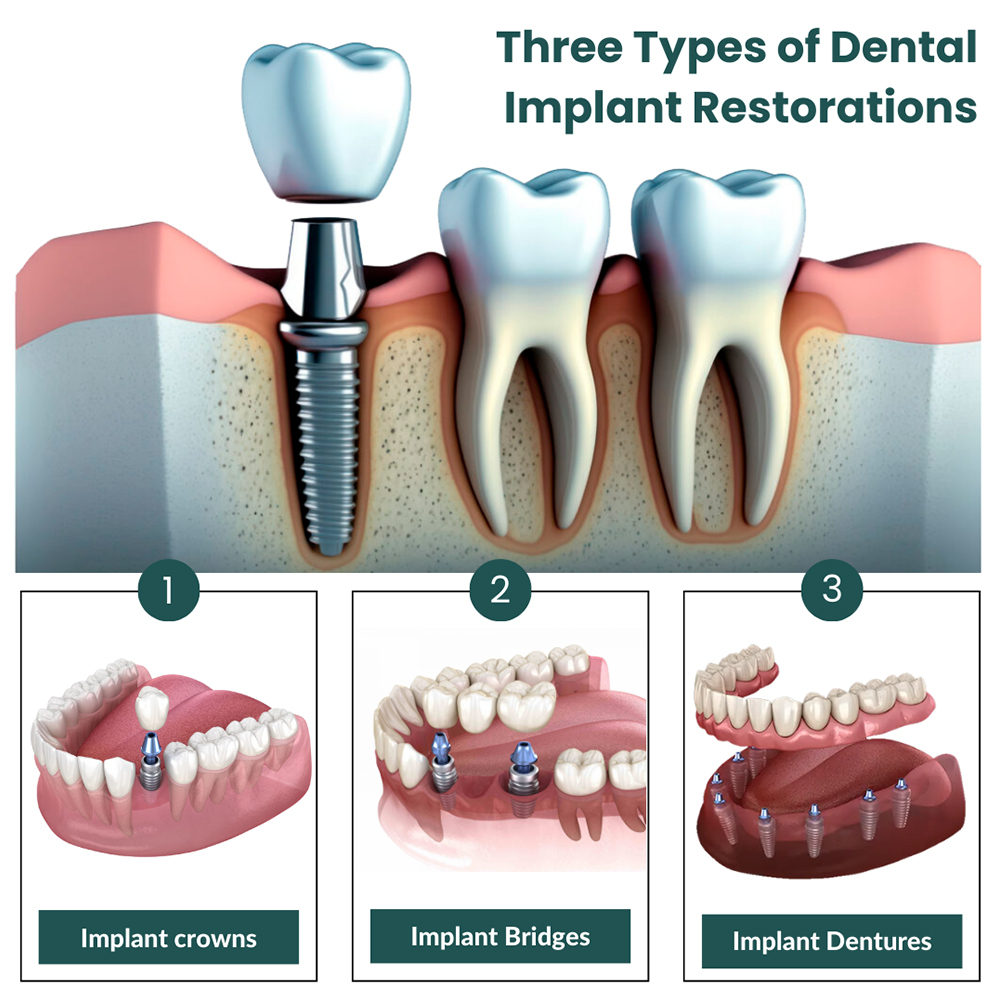Facts About Dental Sense Revealed
Facts About Dental Sense Revealed
Blog Article
6 Simple Techniques For Dental Sense
Table of ContentsThe Facts About Dental Sense RevealedSee This Report on Dental SenseAll About Dental SenseEverything about Dental Sense
are clinical tools operatively dental implanted into the jaw to recover an individual's capability to eat or their appearance. They offer assistance for man-made (phony) teeth, such as crowns, bridges, or dentures. When a tooth is lost due to injury or disease, an individual can experience issues such as fast bone loss, defective speech, or adjustments to eating patterns that lead to discomfort.Oral dental implant systems include an oral implant body and dental implant joint and might additionally include an abutment fixation screw. Wisdom tooth cavity. The oral implant body is operatively placed in the jawbone instead of the tooth's origin. The dental implant joint is typically connected to the dental implant body by the joint fixation screw and extends with periodontals right into the mouth to support the attached man-made teeth
(https://dentalsense1.weebly.com/)Structure of The Dental Implant System choosing oral implants, talk with your oral copyright concerning the prospective benefits and risks, and whether you are a prospect for the treatment. Points to think about: Your overall health is an important factor in establishing whether you are an excellent candidate for dental implants, for how long it will take to heal, and how much time the dental implant might remain in place.
Smoking cigarettes might affect the recovery process and lower the long-term success of the implant. The recovery process for the implant body may take a number of months or longer, throughout which time you normally have a temporary joint in location of the tooth. the dental implant treatment: Meticulously comply with the dental health instructions offered to you by your dental company.
The Dental Sense Ideas
Implant failure can lead to the demand for one more surgery to repair or change the dental implant system. Restores the ability to eat Recovers cosmetic appearance Aids maintain the jawbone from shrinking as a result of bone loss Protects the health of the bordering bone and periodontals Assists keep adjacent (neighboring) teeth steady Improves lifestyle Damages to surrounding natural teeth throughout dental implant placement Injury to the surrounding tissues throughout surgery, such as sinus perforation Injury throughout surgical treatment (for example, fracture of bordering jawbone) Insufficient function, such as seeming like the teeth do not attack together generally An experience that the tooth hangs or turning in place resulting from an abutment screw loosening Implant body failure (looseness of the implant body) because of systemic infection, which might be more likely in individuals with uncontrolled diabetics issues due to local infection linked here in bone and gum tissues sustaining the dental implant body because of postponed recovery, which might be most likely in patients who smoke Difficulty cleaning up the gum tissues around the dental implant, causing bad oral hygiene Neglected gum disease Post-surgical feeling numb because of nerve impingement or damage Always inform healthcare companies and imaging service technicians that you have dental implants before any kind of magnetic vibration imaging (MRI) or x-ray procedures.
FDA is not aware of any damaging occasions reported for MRI or x-ray treatments with dental implants. Dental implants systems are usually made from products that follow global consensus requirements of the International Organization for Standardization (ISO) or ASTM International. These requirements have information of what makes a safe product.

An oral implant is a structure that changes a missing out on tooth. With screw-like gadgets, the cosmetic surgeon inserts an implant into the jawbone, and it acts as an anchor for a fabricated tooth, called a crown.
Dental Sense for Beginners
Some individuals are not qualified for dental implant surgical procedure. It is for oral specialists to operate on people with: acute illnessuncontrollable metabolic diseasebone or soft cells condition or infectionIf these concerns are settled, an individual can have the surgical procedure. In, oral surgeons avoid operating people with: If individuals with any of the above undertake dental implant surgical procedure, there is a higher danger of the implant stopping working.

Oral dental implant surgery is a customized process. Give you time to recover. Attach the article and last crown, bridge or denture.
Next off, your doctor will very carefully put the oral implant right into your jaw. Finally, your surgeon will rearrange your periodontals and shut the cut with stitches. If your implant is near the front of your mouth, your dentist will certainly make a momentary tooth for you to use up until you recover. That method, you won't have a void in your smile while you recover.
The 7-Minute Rule for Dental Sense
During the healing phase, your jawbone ought to fuse to the oral implant. This process can take anywhere from 3 to 9 months.
As soon as your implant heals, your dental professional can attach the joint (small connector blog post) and your last reconstruction (crown, bridge or denture). This usually takes regarding one hour to complete and might require a second small surgery. You shouldn't really feel any kind of pain during your oral implant treatment because your service provider will utilize medication to numb your gums.
Report this page